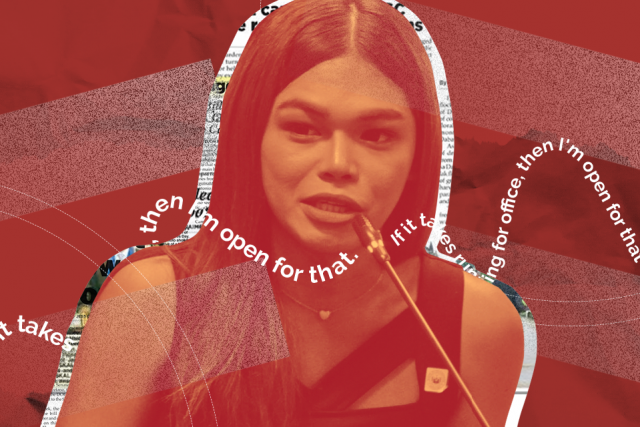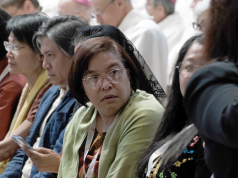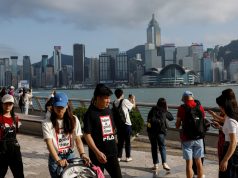
Questions arose after transwoman Gretchen Diez expressed her willingness to run for public office following her experience of discrimination in Farmers Plaza Mall two weeks ago.
Diez in an interview with a local news outlet shared that she is “willing to maximize all of the power” she has to advocate for the LGBTQ+ community even if takes “running for office.”
She only wanted to seek justice for being discriminated in a ladies’ restroom at the mall but some people urged her to run to fully push for her advocacy.
“Sabi na gusto po nila akong tumakbo. Ako po ngayon, sa totoo lang po, gusto ko lang po mabigyan ng katarungan ‘yung nangyari po sa’kin, kasi po 28 years po akong nabubuhay sa mundo, 28 years ko pong naranasan ang diskriminasyon,” Diez said.
“Noong mga panahon na ako’y bata pa at wala pa akong edukasyon at wala pa po akong kaalaman tungkol sa pagsulong ng mga karapatan ko,” she continued.
“Now that I’m given the education, now I’m given this privilege to be the voice of the LGBTQ+ community or being the voice for equality, I’m willing to maximize all of the power that’s in front of me to para po makapag-advocate ng change sa ating bansa,” Diez said.
Her intentions, however, were not well-received by some Filipinos who question her motives after she was seen with Sens. Bong Go and Imee Marcos, calling her “opportunistic.”
Wow, she is really striking while the iron is hot.
Ano ang credentials? Ano ang track record? Tapos ano, tatakbo under the administration and its allies? Lol
I am sorry, but this reeks of opportunism. https://t.co/vnNgcQ6KTK
— Justin Mondragon (@jjcdizon) August 24, 2019
A Twitter user pointed out that “ordinary people” who choose to run for public office is an “indicator of a healthy democracy.”
Sorry, di ko talaga matanggap na oportunismo to. Ordinary people running for elected positions is an indicator of a healthy (not captured/ elite) democracy. https://t.co/DW10wj89Fz
— Shiph Belonguel (@taylorshiph) August 25, 2019
Another Twitter user shared that people shouldn’t “assume” that Diez has no credentials to back her up.
The user also defended Diez by saying that people should “consider the power dynamics” in the latter’s photos with the legislators.
It's sad to see people turn against Gretchen Diez, just because she posed with Imee Marcos and Bong Go for pictures and said she's open to running for public office.
— Dengvaxia Xiaopiña Colada (@satyr_ical) August 24, 2019
“If you’re an ordinary citizen, is it really so easy to refuse a picture with a senator who can push for a law that you want passed? Like it or not, Marcos and Go can vote for (or against) any bill,” the Twitter user added on the thread.
“Personally, I don’t know much about Diez beyond her mistreatment at Farmers Plaza. But we shouldn’t assume she has no credentials. She seems smart and articulate. So she’s already more qualified than many of our current politicians,” the user said.
The user also brought up Diez’s experience, pointing out that people shouldn’t forget the latter was “verbally abused, violently handled, and illegally detained” for insisting to use the ladies’ restroom in a city that has an anti-discrimination ordinance for LGBTQ+ members.
Diez met with some senators following the incident, particularly Sens. Bong Go, Imee Marcos, Manny Pacquiao, Ronald dela Rosa, Miguel Zubiri and Pia Cayetano.
That same day, Hontiveros, known for her stance with LGBTQ+ community, also delivered a privilege speech that renewed calls for the passage of the Sexual Orientation and Gender Identity or Expression Bill, or SOGIE, to prevent instances of discrimination.
Gretchen Diez, the transwoman who figured in a viral video at a Quezon City mall, paid a courtesy call on Senator Imee…
Posted by Imee Marcos on Wednesday, August 14, 2019
When pictures of Diez with some legislators surfaced, some Filipinos criticized her for supposedly being opportunistic but according to her, people should “set aside their political differences” if they wanted “to fight for one cause.”
“We need to be united and set aside political differences. Just because we have different ideas, doesn’t mean we can’t compromise and fight for one cause,” Diez wrote on Facebook.
Other side of the story
Last week, Senate President Tito Sotto shared that closed-circuit footage obtained from the mall indicated some women were initially complaining about Diez’s presence in the restroom.
This prompted the janitress, Chayra Ganal, to approach Diez and said that the latter use the male restroom instead.
“In-approach ko po siya nang maayos. Sabi ko po sa kanya, ‘Ma’am dito na po tayo sa CR ng lalaki.’ ‘Yung PWD (persons with disability) hindi ko na po sa kanya na-offer ‘yun dahil dami din pong nakapila. ‘Yung sa CR kasi po ng lalaki nakita ko doon walang pila, walang tao,” Ganal said in an interview.
Diez claimed that she was just about to fall in line outside the ladies’ restroom when the janitress blocked her.
Who can run for public office?
Anyone who is considered a Filipino citizen can run for public office provided the person is a registered voter, is literate and fulfills certain age and residency requirements.
Under the 1987 Philippine Constitution, a president, vice president, senator or a House of Representative member must be a natural-born citizen, a registered voter (particularly in the district he intends to represent) and is able to read and write.
To become a president and vice-president of the country, there is a minimum age requirement of 40-years-old at the day of elections. He must reside in the Philippines for at least ten years.
A senator needs to be at least 35-years-old and reside in the country for at least two years.
A House of Representatives member, meanwhile, must be at least 25-years-old and be a resident of the district representative he is representing to for at least one year.
For a local government post, an individual must be a natural-born citizen, a registered voter of the municipality, district or province he intends to get elected for at least a year and be literate in Filipino or any other local language or dialect.
A person running as a governor, vice governor, mayor and vice-mayor of highly urbanized cities must be at least 25 years of age.
For those running as a mayor and vice-mayor of component cities or municipalities, they must be at least 21 years of age.
Those running as a council, meanwhile, should be at least 18 years of age. — Artwork by Uela Altar-Badayos









